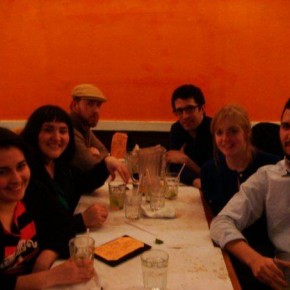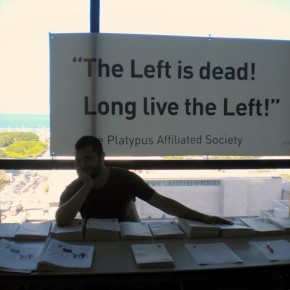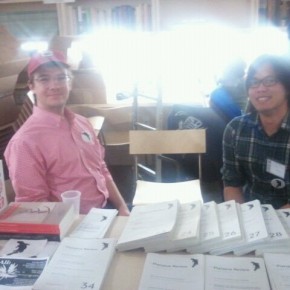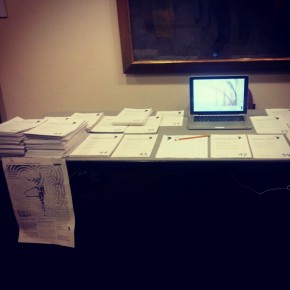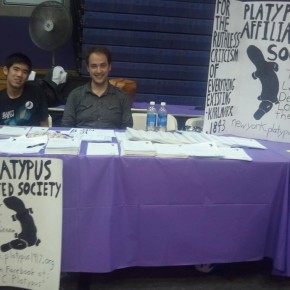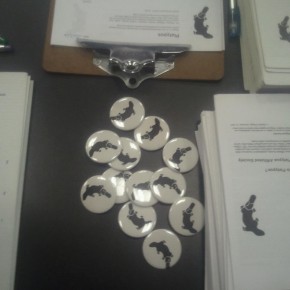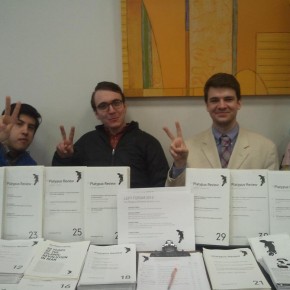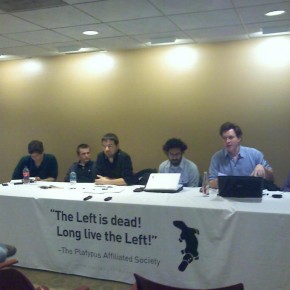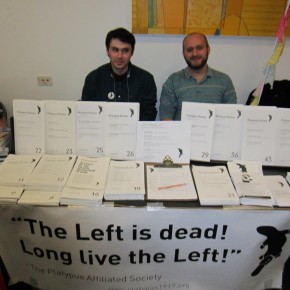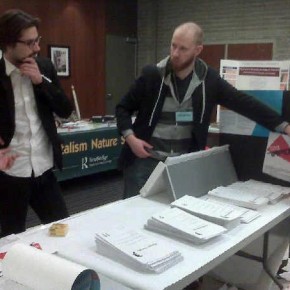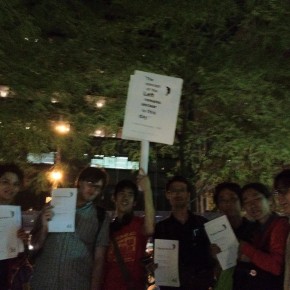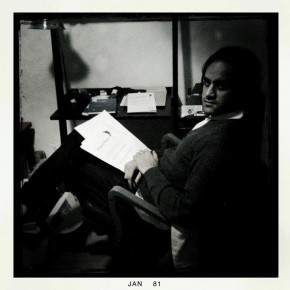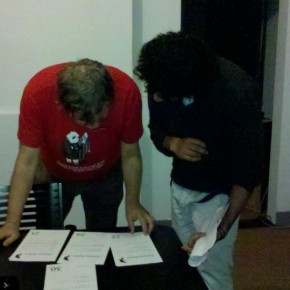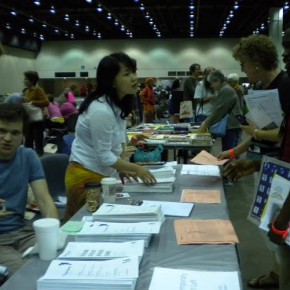A panel event held at the New School in New York City on November 14th, 2012.
LOREN GOLDNER ┇ DAVID HARVEY ┇ ANDREW KLIMAN ┇ PAUL MATTICK
Transcribed in Platypus Review #56:
The present moment is arguably one of unprecedented confusion on the Left. The emergence of many new theoretical perspectives on Marxism, anarchism, and the left generally seem rather than signs of a newfound vitality, the intellectual reflux of its final disintegration in history. As for the politics that still bothers to describe itself as leftist today, it seems no great merit that it is largely disconnected from the academic left’s disputations over everything from imperialism to ecology. Perhaps nowhere are these symptoms more pronounced than around the subject of the economy. As Marxist economics has witnessed of late a flurry of recent works, many quite involved in their depth and complexity, recent activism around austerity, joblessness, and non-transparency while quite creative in some respects seems hesitant to oppose with anything but nostalgia for the past the status quo mantra, “There is no Alternative.” At a time when the United States has entered the most prolonged slump since the Great Depression, the European project founders on the shoals of debt and nationalism. If the once triumphant neoliberal project of free markets for free people seems utterly exhausted, the “strange non-death of neo-liberalism,” as a recent book title has it, seems poised to carry on indefinitely. The need for a Marxist politics adequate to the crisis is as great as such a politics is lacking.
And 2011 now seems to be fading into the past. In Greece today as elsewhere in Europe existing Left parties remain largely passive in the face of the crisis, eschewing radical solutions (if they even imagine such solutions to exist). In the United States, #Occupy has vanished from the parks and streets, leaving only bitter grumbling where there once seemed to be creativity and open-ended potential. In Britain, the 2011 London Riots, rather than political protest, was trumpeted as the shafted generation’s response to the crisis, overshadowing the police brutality that actually occasioned it. Finally, in the Arab world where, we are told the 2011 revolution is still afoot, it seems inconceivable that the revolution, even as it bears within it the hopes of millions, could alter the economic fate of any but a handful. While joblessness haunts billions worldwide, politicization of the issue seems chiefly the prerogative of the right. Meanwhile, the poor worldwide face relentless price rises in fuel and essential foodstuffs. The prospects for world revolution seem remote at best, even as bankers and fund managers seem to lament democracy’s failure in confronting the crisis. In this sense, it seems plausible to argue that there is no crisis at all, but simply the latest stage in an ongoing social regression. What does it mean to say that we face a crisis, after all, when there is no real prospect that anything particularly is likely to change, at least not for the better?
In this opaque historical moment, Platypus wants to raise some basic questions: Do we live in a crisis of capitalism today and, if so, of what sort — political? economic? social? Why do seemingly sophisticated leftist understandings of the world appear unable to assist in the task of changing it? Conversely, can the world be thought intelligible without our capacity to self-consciously transform it through practice? Can Marxism survive as an economics or social theory without politics? Is there capitalism after socialism?
Questions:
1. Do we live in a crisis of capitalism today and, if so, of what sort — political? economic? social? Is capitalism basically the same in its “laws of motion” and can it be grasped equally well today as it was by Marx? What difference, if any, does the collapse of the socialist workers movement make for our understanding of capitalism?
2. Why are sophisticated leftist understandings of the world seemingly unable to assist in the task of changing it? Conversely, is the world intelligible despite our incapacity to transform it politically? Can the Left survive as an economics or social theory? Is our work more “difficult” today in theorizing capitalism, or of a completely different kind than it was for past generations of leftist intellectuals?
3. Many on the Left welcomed the #Occupy movement in 2011 because, above all, it responded to capitalist austerity in its slogans and characterized itself in class terms. Did #Occupy betoken a renewed salience of class? How did #Occupy and other movements worldwide differ from the political response — whether by the new social movements or other political expressions — to the crisis of Fordism beginning in the late 1960s and crystallizing with the Oil Crisis in 1973?
4. How does the present crisis compare with past crises of capital? What might we expect to be the duration of the present crisis? Is there an end in sight? Or are we witnessing the “terminal crisis” of capitalism? How do we know? If not the end of capitalism as such, does the present crisis at least signal an end to neoliberalism? If so, what will take its place?
5. How do your political views influence your understanding of capitalism and crisis? In what sense is economics as a science or discipline independent and autonomous from those politics? How do you avoid the danger of your theory from simply confirming your politics, rather than allowing our understanding of present circumstances to help push beyond our present political impasse?
6. At different moments of its unfolding the crisis has been differently expressed in different locations — a sub-prime mortgage crisis in North America, then a sovereign debt crisis in Europe, and now in a still different form in China. What is the extent of the present crisis and how has it been distributed globally? Unevenly? What does globalization look like in a period of prolonged crisis? Is the era of US hegemony at an end? If so, what will take its place? How is/was American imperialism connected to first Fordism and, later, post-Fordist capitalism and how does the new capitalism challenge a new American Empire-led global (re-)organization?
Featuring:
// Co-Editor at Insurgent Notes; ┇ Author (complete archive of writings available here): — Ubu Saved From Drowning: Class Struggle and Statist Containment in Portugal and Spain, 1974-1977 (2000), — “The Sky Is Always Darkest Just Before the Dawn: Class Struggle in the U.S. From the 2008 Crash to the Eve of Occupy” (2011), “Globalization of Capital, Globalization of Struggle” (2012)
// Distinguished Professor of Anthropology and Geography at the CUNY Grad Center; ┇ Author: — The Condition of Postmodernity (1989), — A Brief History of Neoliberalism (2005), — “Why the US Stimulus Package is Bound to Fail” (2008), — The Enigma of Capital and the Crises of Capitalism (2011), — Rebel Cities: From the Right to the City to the Urban Revolution (2012)
// Professor of Economics at Pace University; ┇ Contributing author to the Marxist-Humanist Initiative’s (MHI’s) With Sober Senses since 2009; ┇ Author: — Reclaiming Marx’s “Capital”: A Refutation of the Myth of Inconsistency (2007), — The Failure of Capitalist Production: Underlying Causes of the Great Recession (2012)
// Teaches Philosophy at Adelphi University; ┇ Former editor of the International Journal of Political Economy (1987-2004), frequent contributor to The Brooklyn Rail ┇ Author: — Social Knowledge: An Essay on the Nature and Limits of Social Science (1986), — Art in Its Time: Theories and Practices of Modern Aesthetics (2003), — Business as Usual: The Economic Crisis and the Failure of Capitalism (2011)
A panel event held on November 14th, 2012, at Dalhousie University. The first iteration of our "Democracy and the Left" international panel series.
Panelists:
Matthew Furlong (Foundation Year and Contemporary Studies Programme, King’s University)
David Howard (Historical and Critical Studies, NSCAD University)
John Hutton (student activist, Dalhousie)
Clare O’Connor (Toronto activist and author)
From the financial crisis and the bank bail-outs to the question of “sovereign debt”; from the Arab Spring to Occupy Wall Street; from the struggle for a unified European-wide policy to the elections in Greece and Egypt that seem to have threatened so much and promised so little — the need to go beyond mere “protest” has asserted itself: political revolution is in the air, again.
At the same time, the impending general election in the U.S. seems, by comparison, to be a non-event, despite potentially having far-reaching consequences for teeming issues word-wide. Today, the people — the demos — seem resigned to their political powerlessness, even as they rage against the corruption of politics. Hence, while contemporary demands for democracy to politicize the demos, they are also indicative of social and political regression that asks urgently for recognition and reflection. Demands for democracy “from below” end up being expressed “from above”: The 99%, in its already obscure and unorganized character, didn’t express itself as such in the various recent elections, but was split in various tendencies, many of them very reactionary.
Democracy retains an enigmatic character, since it always slips any fixed form and content, since people under the dynamic of capital keep demanding at times “more” democracy and “real” democracy. But democracy can be like Janus: it often expresses both the progressive social and emancipatory demands, but also their defeat, their hijacking by an elected “Bonaparte”.
What is the history informing the demands for greater democracy today, and how does the Left adequately promote — or not — the cause of popular empowerment?
What are the potential futures for “democratic” revolution, especially as understood by the Left?
Questions for panelists to consider:
What would you consider as “real” democracy, as this has been a primary demand of recent spontaneous forms of discontent (e.g. Arab Spring, Occupy, anti-austerity protests, student strikes)?
What is the relationship between democracy and the working class today? Do you consider historical struggles for democracy by workers as the medium by which they got “assimilated” to the system, or the only path to emancipation that they couldn’t avoid trying to take?
Do you consider it as necessary to eschew established forms of mass politics in favor of new forms in order to build a democratic movement? Or are current mass form of politics adequate for a democratic society?
Why has democracy emerged as the primary demand of spontaneous forms of discontent? Do you also consider it necessary, or adequate, to deal with the pathologies of our era?
Engels wrote that “A revolution is certainly the most authoritarian thing there is”. Do you agree? Can this conception be compatible with the struggle for democracy?
How is democracy related with the issue of possibly overcoming capital?
Is there a difference between the ancient and the modern notion of democracy and, if so, what is the source of that difference? Does “real” democracy share more with the direct democracy of ancient polis?
Is democracy oppressive, or can it be such? How would you judge Lenin’s formulation that: “…democracy is also a state and that, consequently, democracy will also disappear when the state disappears.”
Join the Facebook event page.
Download a larger flier for the event.
NYU Kimmel Center, Room 805
60 Washington Square South
Manhattan, New York 10011
Thursday // 11.15.2012 // 7:00-9:00 PM
The Platypus Review recently celebrated the publication of its fiftieth issue. Come join members of the Platypus Review at a launch party to celebrate this momentous occasion, also the start of our international Radical Interpretations of the Present Crisis panel series. We will be enjoying sumptious Vietnamese sandwiches in the NYU Kimmel Center at 7 PM, followed by drinks in Vol de Nuit at 148 West 4th St after 9 PM.
We will also be video conferencing with a range of speakers from London, Greece, Germany, Austria, Chicago, and discussing some of our very own Platypus Review staff from New York!
Platypus Review editorial statement of purpose and submission guidelines
Statement of purpose
Taking stock of the universe of positions and goals that constitutes leftist politics today, we are left with the disquieting suspicion that a deep commonality underlies the apparent variety: What exists today is built upon the desiccated remains of what was once possible.
In order to make sense of the present, we find it necessary to disentangle the vast accumulation of positions on the Left and to evaluate their saliency for the possible reconstitution of emancipatory politics in the present. Doing this implies a reconsideration of what is meant by the Left.
Our task begins from what we see as the general disenchantment with the present state of progressive politics. We feel that this disenchantment cannot be cast off by sheer will, by simply “carrying on the fight,” but must be addressed and itself made an object of critique. Thus we begin with what immediately confronts us.
The Platypus Review is motivated by its sense that the Left is disoriented. We seek to be a forum among a variety of tendencies and approaches on the Left—not out of a concern with inclusion for its own sake, but rather to provoke disagreement and to open shared goals as sites of contestation. In this way, the recriminations and accusations arising from political disputes of the past may be harnessed to the project of clarifying the object of leftist critique.
The Platypus Review hopes to create and sustain a space for interrogating and clarifying positions and orientations currently represented on the Left, a space in which questions may be raised and discussions pursued that would not otherwise take place. As long as submissions exhibit a genuine commitment to this project, all kinds of content will be considered for publication.
Submission guidelines
Articles in the Platypus Review will typically range in length from 750–4,500 words, but longer pieces will also be considered. Please send article submissions and inquiries about the project to: review_editor@platypus1917.org. All submissions should conform to the Chicago Manual of Style.
Readable PDFs of past issues
- The Platypus Review, № 1 — November 2007
- The Platypus Review, № 2 — February 2008
- The Platypus Review, № 3 — March 2008
- The Platypus Review, № 4 — April-May 2008
- The Platypus Review, № 5 — May-June 2008
- The Platypus Review, № 6 — July 2008
- The Platypus Review, № 7 — October 2008
- The Platypus Review, № 8 — November 2008
- The Platypus Review, № 9 — December 2008
- The Platypus Review, № 10 — February 2009
- The Platypus Review, № 11 — March 2009
- The Platypus Review, № 12 — May 2009
- The Platypus Review, № 13 — July 2009
- The Platypus Review, № 14 — August 2009
- The Platypus Review, № 15 — September 2009
- The Platypus Review, № 16 — October 2009
- The Platypus Review, № 17 — November 2009
- The Platypus Review, № 18 — December 2009
- The Platypus Review, № 19 — January 2010
- The Platypus Review, № 20 — February 2010
- The Platypus Review, № 20, Supplement on the Iranian Revolution — February 2010
- The Platypus Review, № 21 — March 2010
- The Platypus Review, № 22 — April 2010
- The Platypus Review, № 23 — May 2010
- The Platypus Review, № 24 — June 2010
- The Platypus Review, № 25 — July 2010
- The Platypus Review, № 26 — August 2010
- The Platypus Review, № 27 — September 2010
- The Platypus Review, № 28 — October 2010
- The Platypus Review, № 29 — November 2010
- The Platypus Review, № 30 — December 2010
- The Platypus Review, № 31 — January 2011
- The Platypus Review, № 32 — February 2011
- The Platypus Review, № 33 — March 2011
- The Platypus Review, № 34 — April 2011
- The Platypus Review, № 35 — May 2011
- The Platypus Review, № 36 — June 2011
- The Platypus Review, № 37 — July 2011
- The Platypus Review, № 38 — August 2011
- The Platypus Review, № 38, Supplement on the Legacy of Trotskyism — August 2011
- The Platypus Review, № 39 — September 2011
- The Platypus Review, № 40 — October 2011
- The Platypus Review, № 41 — November 2011
- The Platypus Review, № 42 — December 2011-January 2012
- The Platypus Review, № 43 — February 2012
- The Platypus Review, № 44 — March 2012
- The Platypus Review, № 45 — April 2012
- The Platypus Review, № 46 — May 2012
- The Platypus Review, № 47 — June 2012
- The Platypus Review, № 48 — July-August 2012
- The Platypus Review, № 49 — September 2012
- The Platypus Review, № 50 — October 2012
- The Platypus Review, № 51, Special Issue on the Election — November 2012
- The original editorial board
- Marco at the 2nd International Convention
- Pac Pobric and Sacha Amry
- Looking back on Occupy 2012
- DIY Platypus w Jeremy Cohan and Brian Hioe
- Ben Blumberg and Pac Pobric
- Jerzy, Moritz, Haseeb, and Thodoris
- Jacob Cayia and Chris Mansour with a nice display stand of past issues of the Platypus Review at the Left Forum 2012
- Soren Whited of Platypus mans our stand at Left Forum 2009
- Lisa Montanarelli, Ross Wolfe, and Brian Hioe with Japanese comrades from Zenko Peace, holding up copies of the Platypus Review
- The Platypus Review in a Moscow bookshop (2012), courtesy of Haseeb Ahmed
- Our fearless leader and editor-in-chief, Sunit Singh, holding a copy of the Platypus Review (2011)
- Slovenian theorist Slavoj Žižek with Haseeb Ahmed in Maastricht (2011), looking over some copies of the Platypus Review
- Nate Smith with some copies of the Platypus Review at the US Social Forum in Detroit, 2010
On November 4th, 2012, Platypus member Chris Cutrone gave a talk on the Marxist notion of class consciousness at the Ramón Miranda Beltrán exhibition, "Chicago is My Kind of Town," at the gallery Julius in Chicago.
Transcripted in Platypus Review #51 (Click banner below to see):

Join Platypus for a movie screening at Goldsmiths: //Thursday 8th Nov RHB 114 7pm How is Hollywood’s interpretation of the financial crisis of 2008 useful or problematic? What other interpretations are there?


